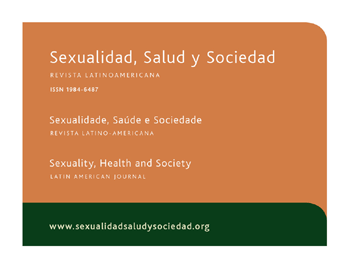EDITORIAL
This issue of Sexuality, Health & Society brings significant contributions to a reflection on the tensions at stake and in conflict today in the field of sexuality, configuring new moralities, sensibilities, and experiences, as well as new evaluation criteria about what must be considered healthy and normal. Readers will find examples of innovative ways to address those tensions, applying conceptual frameworks which seek to go beyond classical dichotomies, such as reason/emotion, body/culture, individual/society, and health/illness. Dialogue among the articles in this issue takes place at a multiplicity of theoretical and methodological registers, and related to a variety of empirical referents.
Orejuela, Piedrahita & Renza's text on swinger practice and lifestyle in Cali brings instigating elements to an analysis of the process by which certain sexual practices achieve the right to citizenship (and normalcy) more or less rapidly, according to different national contexts, and of the engagement of researchers in this process. As a counterpoint, based on rich ethnographic material, the article by Cunha discusses how the incidence of modern pedagogic devices on the sexual experiences of youths living with HIV/AIDS in Rio de Janeiro represents certain practices, desires and emotions as unsafe, unhealthy and, therefore, illegitimate. The reason to belie perversity, in one case, and to morally condemn, in the other, is the same. That fact reveals how any experience not involving individuals who are supposedly free, responsible and equal is pushed out of the circle of what is social and politically acceptable.
As Gomez & Barrientos show regarding the effects of social prejudice on the mental health of gays and lesbians in Antofagasta, this new moral configuration seems to heighten social sensibility to violence, opening space for new perceptions about what might or might not be considered prejudice or sexual discrimination, about its psychological effects on certain groups and, finally, about how to measure its incidence.
In this landscape, emotional self-control stands out as requirement which makes gender and sexual subjects intelligible. Coelho's analysis of narratives by Rio de Janeiro couples from different generations who have been the victims of robbery in their homes is enlightening in this sense. She looks at transformations and continuities in the meaning of emotional control and self-control for the construction of different masculinities and femininities. It seems that such control, a foundation for the freedom and responsibility required from these new actors, when not promoted by pedagogic techniques, it is offered by medical-pharmacologic technology, as shown by Nucci in her paper on the social meaning of the birth control pill. Beyond the control of reproduction, the pill is seen as a device capable of "emancipating" women from a natural femininity, supposedly responsible for their fickleness and their difficulty to sustain regular control over themselves.
Besides their empirical contributions, the articles in this issue represent a joint effort to go beyond old dilemmas, particularly acute in reflections about 'objects' that-as is the case with sexuality, gender, health, and emotions-engage the body immediately. Rodrigues' paper points explicitly in this direction. While revisiting the dialog between feminist author Judith Butler and philosopher Jacques Derrida, she addresses one of the most powerful and influential critical theories in the field of gender and sexuality. As Rodrigues shows, such authors have been fundamental to contest an intellectual attitude that, operating through incommensurable dualisms derived from the old spirit/matter opposition, would end up-in her view-"purifying" human experience to the point of disfiguring it (almost) completely.
Publication Dates
-
Publication in this collection
13 Apr 2012 -
Date of issue
Apr 2012

